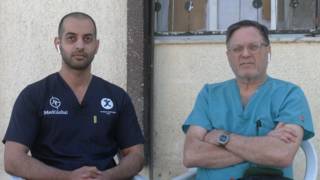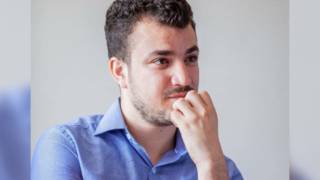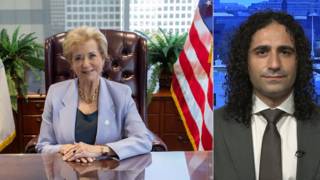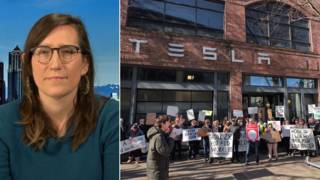HeadlinesOctober 03, 2017
Las Vegas: 59 Dead, 527 Injured as Police Search for Shooter’s Motive
In Las Vegas, the toll in Sunday night’s mass shooting rose overnight to 59 dead and 527 wounded, as investigators searched for clues about what drove 64-year-old Nevada resident Stephen Paddock to carry out the worst massacre in modern U.S. history. Police say they found Paddock dead of a self-inflicted gunshot wound shortly before midnight Sunday after they used an explosive to break into his suite on the 32nd floor of the Mandalay Bay hotel, where he was holed up with an arsenal of guns and thousands of rounds of ammunition. Paddock lived in a retirement community in Mesquite, Nevada. He previously worked as an accountant and a property manager, and spent three years working at a weapons company that was later acquired by Lockheed Martin. Neighbors described Paddock as a recluse who spent long hours playing video poker. Stephen Paddock’s father, Benjamin Hoskins Paddock, was once on the FBI’s most wanted list, after he escaped from a federal prison in the 1960s after a conviction on serial bank robbery charges. At the time, the FBI called Benjamin Paddock psychopathic and said he “reportedly has suicidal tendencies and should be considered armed and very dangerous.” On Monday, Stephen Paddock’s brother, Eric Paddock, told reporters the massacre was a complete surprise to the family.
Eric Paddock: “Just nothing. It’s all in the public record. He did stuff. He went to college. He had a job. You know, we owned some apartments, we sold some apartments. I mean, there’s nothing.”
Police now say Paddock’s girlfriend, Marilou Danley, was out of the country at the time of the shooting and has been cleared of any involvement.
Las Vegas Shooter Stephen Paddock Had Arsenal of 42 Guns, Explosives
Paddock reportedly used a hammer to smash a pair of windows and set up two high-powered rifles with scopes on tripods overlooking the Route 91 Harvest country music festival below, where he fired into a crowd of more than 20,000 concertgoers. Paddock had at least 23 firearms in his hotel suite, and a further 19 guns were later found at his home, along with explosives and thousands of rounds of ammunition. Paddock had no criminal record and was able to purchase his arsenal legally. Gun experts believe he may have used a trigger device—available for purchase online for as little as $40—that can turn a semi-automatic assault rifle into a fully automatic machine gun. At the White House, Press Secretary Sarah Huckabee Sanders said it was not the time to talk about gun control.
Press Secretary Sarah Huckabee Sanders: “There’s a time and place for a political debate, but now is the time to unite as a country. There is currently an open and ongoing law enforcement investigation. A motive is yet to be determined, and it would be premature for us to discuss policy when we don’t fully know all the facts or what took place last night.”
On Twitter, journalist Naomi Klein responded, “Don’t talk about guns after a massacre. Or climate change after storms. Or austerity after firetrap buildings burn. Talk when no one listens.”
Republicans Call for Mourning and Prayer Amid Push to Liberalize Gun Laws
On Capitol Hill, Republican leaders called the massacre a moment for national mourning and prayer, even as lawmakers advanced a pair of bills that would liberalize gun laws. One measure that could pass the House as early as this week would remove long-standing restrictions on silencers. The bill to allow silencers comes despite the fact that concertgoers at Sunday night’s music festival were alerted to the massacre by the sound of gunfire emerging from the high-rise hotel above them. Another bill expected to move through Congress this fall would allow people to lawfully carry concealed weapons across state lines into jurisdictions that don’t allow them. Speaking from the Senate floor, Connecticut Democratic Senator Chris Murphy condemned Congress’s failure to tackle gun control after the Sandy Hook Elementary School massacre in 2012, in which a shooter with an assault rifle killed 20 young schoolchildren and six adults in Newtown, Connecticut.
Sen. Chris Murphy: “The hurt is deep, the scars are wide in Newtown, but they are made wider by the fact that this body, in four-and-a-half years, has done absolutely nothing to reduce the likelihood of another mass shooting. And indeed, because we have done nothing, the mass shootings continue.”
Trump to Visit Puerto Rico After Calling Critics “Politically Motivated Ingrates”
President Trump travels to Puerto Rico today, some two weeks after Hurricane Maria devastated the island, destroying its electrical grid and leaving more than half of Puerto Rico’s 3.5 million residents with no access to clean water. Food and fuel continue to be in short supply, and the Federal Communications Commission says nearly 90 percent of cellphone towers remain out of service. Trump’s visit comes just two days after he called Puerto Rican leaders who’ve criticized his hurricane response “politically motivated ingrates,” and said Puerto Ricans “want everything to be done for them.” Later in the broadcast, we’ll go to San Juan for an update on a protest against Trump’s visit and the latest on Hurricane Maria relief efforts.
Supreme Court Opens Term with Workers’ Rights Case
The Supreme Court opened a new term Monday, hearing arguments in a case that could expand the rights of millions of workers to sue their employers. The case, NLRB v. Murphy Oil, pits workers who want the right to join class action lawsuits against employers—backed by the Trump administration—who want to force workers to enter into binding arbitration agreements that prohibit collective litigation. The Economic Policy Institute says more than half of all non-union U.S. workers are currently forced to work under mandatory arbitration rules.
White House Advisers Jared Kushner, Ivanka Trump Used Private Email Server
Politico is reporting that White House advisers Jared Kushner and Ivanka Trump sent hundreds of emails from a previously undisclosed private email account—including official White House business. It’s the third such disclosure of a private email account linked to the Kushner family, and it comes after CNN reported Kushner failed to inform Senate investigators about his use of private email servers during a closed-door inquiry last July with Senate Intelligence Committee staff.
Yemen: ICRC Warns of New Outbreaks as Cholera Cases Near 1 Million
In Yemen, the International Committee of the Red Cross warns a massive cholera epidemic shows no signs of stopping—and that the country’s tattered health and sanitation systems could pave the way for the spread of other diseases. This is Alexandre Faite, head of the ICRC delegation in Yemen.
Alexandre Faite: “The situation, from a humanitarian standpoint, is a catastrophe. We have something which is close to a million cases of suspected cholera maybe by the end of the year. But this, as I told you, is only possibly an external illustration of something more serious. We could have an outbreak of something else.”
The ongoing U.S.-backed, Saudi-led bombing campaign has destroyed Yemen’s health, water and sanitation systems, with the U.N. warning less than half of Yemen’s health facilities are operational.
Syria: 11 Dead as Suicide Bombs Target Damascus Police Station
In Syria, a pair of suicide bombers struck a police station in Damascus Monday, killing 11 people and wounding 20 others. There was no claim of responsibility for the attack, which was the largest to rock the capital city since a car bomb attack killed 20 people in July.
Kenyan Police Clash with Supporters of Opposition Presidential Candidate
In Kenya’s capital Nairobi, police fired tear gas Monday at protesters blockading roads and burning tires, as opposition leader Raila Odinga demanded the government fire electoral officials and bar the ruling party from changing voting laws. The protests come after Kenya’s Supreme Court invalidated August’s presidential ballot, citing irregularities in President Uhuru Kenyatta’s re-election victory. A new election is scheduled for October 26.
Spain: Mass Protests Continue as EU Rejects Catalan Independence Vote
In Spain’s Catalonia region, pro-independence groups have called a general strike today after police raided polling stations and beat protesters and prospective voters Sunday during an outlawed independence referendum. The violence injured more than 800 and led to mass protests Monday outside police stations across the region. Spain has called the referendum illegal and illegitimate, and on Monday the European Commission agreed, saying if Catalonia does become independent, it will be “outside the European Union.”
New York Judge Throws Out Case Against Activist Prosecuted by NYPD
Back in the U.S., a New York City judge threw out charges Monday against a Black Lives Matter protester, in a case that drew alarm from defense lawyers after the District Attorney’s Office handed the case over to the New York City Police Department’s Legal Bureau for prosecution. This is Cristina Winsor, the activist who was acquitted on charges of disorderly conduct and walking in a roadway.
Cristina Winsor: “I discovered that instead of being prosecuted by the DA, I was going to be prosecuted by the NYPD Legal Bureau. So, that is, to me, a real conflict of interest, because it should be separate: The NYPD should arrest people; they shouldn’t arrest and prosecute people. … My fear is that it would make people more and more afraid to put themselves out there and express themselves in the streets and that we’d be moving closer to what we would call a police state.”
Rock Legend Tom Petty Dies of a Heart Attack at 66
And rock 'n' roll hall of famer Tom Petty has died at the age of 66. Petty rose to fame in the 1970s as leader of The Heartbreakers and is best known for hit songs including “I Won’t Back Down,” “American Girl” and “Refugee.” Petty grew up in Gainesville, Florida, and later spoke out against racism in the South. In 2015, he told Rolling Stone magazine he deeply regretted using Confederate flag imagery onstage as part of his “Southern Accents” tour in 1985, calling the flag a symbol of hate. Petty also condemned the rise of for-profit prisons and voiced support for the Black Lives Matter movement, saying, “What’s going on in society is unforgivable. As a country, we should be more concerned with why the police are getting away with targeting black men and killing them for no reason.” Tom Petty died of a heart attack at the age of 66.
Most popular
- 1
- 2
- 3
- 4
Non-commercial news needs your support
Please do your part today.











Media Options